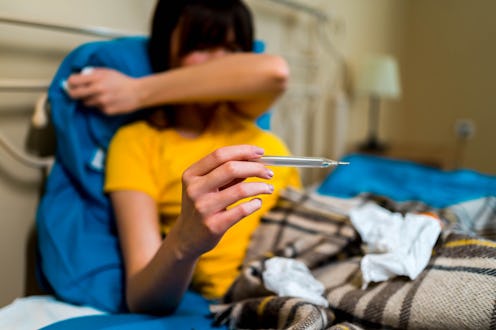Health
How To Treat A Fever After Getting The COVID-19 Vaccine, According To A Doctor
Plus, why you might get one in the first place.

You've heard it from your friends who've already gotten their shots — getting the COVID vaccine can knock you off your feet for a couple of days. According to the Centers for Disease Control and Prevention (CDC), getting a fever is a common side effect of vaccination, so it's important to know what to do when you have a fever after getting the COVID vaccine.
Why Might You Have A Fever After Getting The COVID Vaccine?
"When you receive a vaccination, your immune system gets activated in order to build a protective response against the viral protein," says Dr. Sanjeev Jain, M.D., a doctor double-board certified in immunology and internal medicine at Columbia Asthma and Allergy Clinic. Since your immune system is turned on by the vaccine, your body will respond accordingly, often by heating you up from the inside. "When the inflammatory mediators spread throughout your body, you can also have fever, muscle aches, and headache," Dr. Jain explains.
If you don't get a fever, that doesn't mean your immune system isn't responding properly to the vaccine. According to the Cleveland Clinic, more than 50% of people don't experience any side effects at all, yet the COVID vaccines are 94% effective. (That's very good!) Just because you might get a fever doesn't mean you will, and that's OK.
When Should You Be Concerned About A Post-Vaccination Fever?
Developing a fever is a fairly common side effect of the COVID vaccine, according to the CDC. Even a high fever may not be a red flag — clinical trials for both the Moderna and Pfizer vaccines showed that developing a high fever after the COVID vaccine (between 102.2 and 104 degrees) was very uncommon, but not unheard of.
Dr. Jain says that you need to look at your post-vaccine fever in the context of your other side effects to know when it's something to be concerned about. "A normal fever side effect will typically develop the same day you receive the vaccine and will likely be accompanied by the other commonly reported symptoms [like injection site soreness and lymph node swelling in the armpit of the injected side]," he explains. But other side effects can be your cue to check in with your doctor. "If you develop additional symptoms not associated with the vaccine such as neck pain, diarrhea, shortness of breath, or cough, then you should follow up with your provider to further assessment." If you have any questions, particularly around your unique health situation, it doesn't hurt to give your doctor a call.
How Do You Treat A Post-Vaccine Fever?
While post-vaccine side effects tend to go away on their own after a few days, Dr. Jain says that there are ways to treat yourself if you're in discomfort. "If the fever goes above 102 degrees Fahrenheit, it may be appropriate to use Tylenol to reduce fever," he tells Bustle. You'll also want to make sure you're getting plenty of sleep and water. "Adequate hydration and rest can also be beneficial for patients experiencing post-vaccine fevers," Dr. Jain says. Again, if you have any questions or concerns related to your personal health experience, giving your doctor a call is always encouraged. Otherwise, plan on taking it easy while your new immunity develops.
Experts:
Dr. Sanjeev Jain, M.D., doctor double-board certified in immunology and internal medicine, Columbia Asthma and Allergy Clinic
This article was originally published on